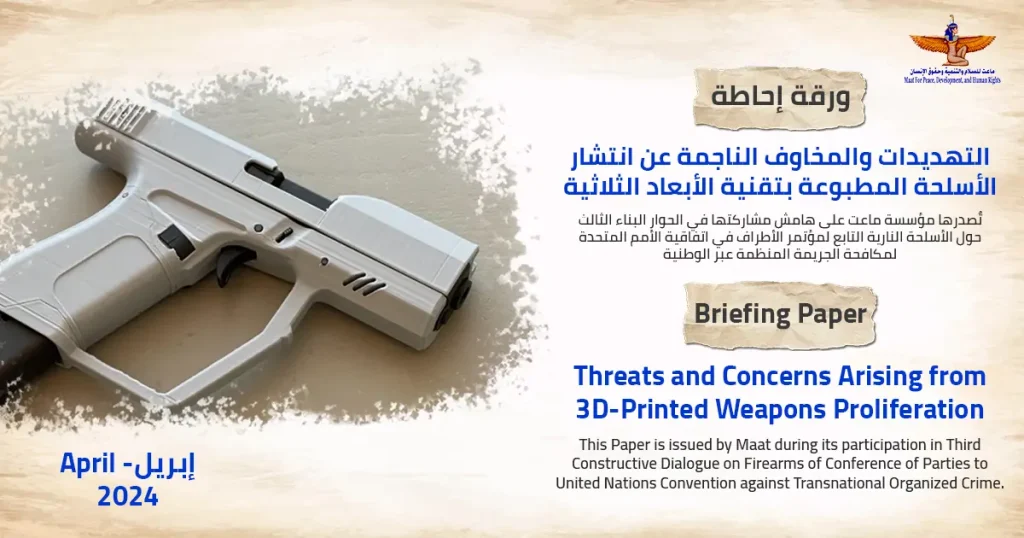In its sixth Annual Report, Maat Monitors the Human Rights Situation in the Arab region
Okeil: The Russian-Ukrainian war has cast a negative shadow on all human rights and development in Arab countries
Sherif Abdel Hamid: Sustainable development and human rights are two sides of the same coin
This morning, March 26, 2023, Maat for Peace, Development and Human Rights issued its sixth annual report entitled: "Amidst Crises: The Situation of Human Rights in the Arab Region during 2022". The report, which exceeds 400 pages, reviews and analyzes the human rights situation in 22 Arab countries during 2022. It indicated the changes and developments that have impacted the human rights situation in all relevant fields and spaces, including the provisions of legislation and laws as well as the policies, practices and decisions taken that have impacted the human rights situation in these countries.
As was the case in previous reports, the first Chapter of this report addresses the position of Arab countries towards international human rights mechanisms. This Chapter provided an overview and detailed observations on the extent of cooperation of these countries with international human rights mechanisms, including the Human Rights Council and the Universal Periodic Review mechanism, treaty committees, and special procedures. It tries to highlight the challenges facing Arab countries in cooperating with human rights mechanisms and provided an in-depth analysis of the efforts of Arab countries to address these challenges.
In its second Chapter, the Report discussed the position of Arab countries towards achieving the goals of sustainable development. It provided a comprehensive analysis of the Arab countries commitments of Arab countries to the goals of sustainable development and the challenges they face in achieving them. The Report tried to highlight the efforts made by Arab countries to integrate sustainable development into their policies, programs and initiatives. The Report’s chapter three provided an overview of the human rights situation in the Arab countries, as well as the human rights violations committed in 2022, examined the efforts made by the Arab countries to address these violations and made recommendations to improve the human rights situation in the Arab countries.
The Report’s fourth and final chapter focused on climate change and human rights in the Arab region. It provided an in-depth analysis of the impact of climate change on human rights in Arab countries, including the rights to life, health, water, food, and housing, and tried to clarify the efforts made by Arab countries in 2022 to mitigate the effects of climate change and the challenges faced in this regard.
The methodology of the Report relied on monitoring policies, legislation, and practices from a human rights perspective based on national Constitutions and laws of each country, in addition to the international human rights standards that these countries adhered to at the international and regional levels. Therefore, this Report, similar to previous ones, is a key human rights assessment tool. The importance of the annual human rights report issued by Maat lies in the objective investigation of the reality of human rights in the Arab region by highlighting the shortcomings and violations on the one hand, and the progress made on the other hand, in order to provide applicable recommendations that contribute to the collective advancement of the reality of human rights in the Arab world.
In this context, Ayman Okeil, an international human rights expert and President of Maat, said that this Report comes amidst various complexities at the global scene. No sooner has the Covid-19 pandemic ended, allowing the world to rebuild after the repercussions of the pandemic that have undermined global economies, than the Russian-Ukrainian erupted in early 2022, leading to a new human tragedy whose features were manifested in the killing of thousands of innocent victims, the displacement of millions, and the starvation of hundreds of millions around the world as a result of its unprecedented consequences on international trade and the global economy, supply chains and global food security.
The Arab world is a part of the global economic and political system; therefore, the repercussions of the Russian-Ukrainian war were strongly felt in the majority of Arab countries. Levels of food insecurity exacerbated, development projects and efforts were disrupted, and living standards decreased in 2022 due to the crises emerging from this war that threaten the economies of these countries, which cast a negative shadow on the overall human rights of the Arab citizen, especially the economic, social and cultural rights that were severely affected by this war.
For his part, Sherif Abdel Hamid, Director of the International Mechanisms Unit at Maat, pointed out that the development efforts made in most Arab countries in 2022 were not up to the difficult challenges posed by global crises. Levels of hunger, poverty and food insecurity rates exacerbated, living standards declined, development projects were suspended, school drop-out rated, and gender disparities increased in most Arab countries. Sustainable development and human rights are two sides of the same coin, Abdel Hamid explained. Therefore, promoting them requires concerted efforts among Arab countries in four main areas of action, including building diversified and competitive economies; promoting strong governance systems based on accountability, transparency and participation of institutions; supporting and enabling the participation of marginalized communities without discrimination; and driving a green recovery which are at the heart of sustainable development.

 |
 |











